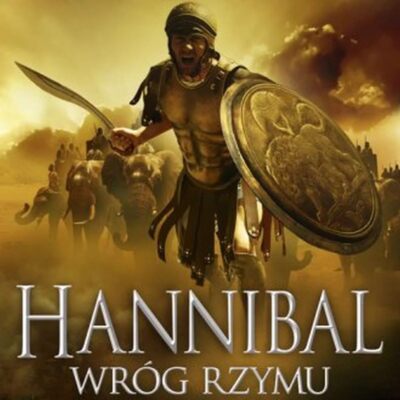The book “Hannibal. Enemy of Rome” by Ben Kane is the first part of a new series, in which this time we will be transported to one of the most amazing periods in history. This time the author decided to focus on the times of the Second Punic War (218-201 BCE) and the rivalry between the hated enemies of Rome and Carthage. As was the case in Kane’s previous trilogy – “Forgotten Legion Chronicles” – we have to reckon with the fact that the author indulged in slight fantasies at times, which, in my opinion, did not affect the historical value of the novel in any way.
Ben Kane has already become known to many readers as a passionate writer who translates his interest in history and the military into extremely interesting books set in ancient times. The Hannibal series was started by the author in 2011. Many people have been waiting for the Polish edition for a long time; which finally saw the light of day.
The novel takes us to the year 219 BC, to the hot shores of Carthage. We meet two young friends, Hanno and Suni, who are unfortunately swept away by a storm on their fishing boat and end up in the hands of slave traders. To their horror, they are separated and sold into slavery. One of the main characters, Hanno, ends up in a Roman equestrian family, where he has to serve the hated “sons of the Wolf”. The young man was brought up by his father in the spirit of patriotism and hatred of the Romans, on whom – from the First Punic War – Carthage tried to take revenge. Finally, the man who was to be the leader and leader of the vengeful Punians – Hannibal Barkas – appeared on the scene. The author shows us the political divisions in Carthage, but also the adoration of ordinary warriors and elites for the majesty and strength of the Carthaginians. Faith in victory over the Romans is great, and Hannibal plans to carry out a bold plan to confront the enemy on Italian soil.
Of course, Ben Kane, in order to keep the action volatile, maneuvers events and characters to keep the reader in constant interest. The Roman-Punic War is not shown to us from one perspective. We also get to know Quintus, Gaius, Fabricius, Atia, or Aurelia – people who are representatives of the middle-wealth social stratum of Rome. Hanno – a proud young Carthaginian – must serve his hated enemy. However, an unexpected coincidence causes Hanno and Quintus to become friends, and their friendship will be put to a great test over time when they both find themselves in opposing military camps.
Hannibal Barkas himself, as I mentioned, appears to us as a hero for whom soldiers are able to cross even the peaks of the Alps. The author tries to reproduce the moods and conditions that could have accompanied Hannibal’s multicultural mercenary army. The battles in which Hannibal took part are shown in an interesting way. The siege of the city of Saguntum, which did not receive support from its ally the Romans, was shown very credibly and was completely destroyed. Many times in the novel, Roman heroes will mention this event as an example of disgrace and lack of solidarity.
Naturally, the author did not omit such events as: the famous Senate delegation to Carthage, demanding the handing over of Hannibal as the ringleader of the capture of Saguntum; the march of the Punic army through the territories of the Iberian and Gallic tribes; crossing the Alps and the hardships associated with it; or the Battle of Trebia. Very often, the author draws us descriptions of powerful elephants, which are sometimes even used to torture captives.
As in the previous series, the book was supplemented with the author’s commentary at the end, in which we can find out why Kane decided to reveal the plot or change the historical reality. Everything is supported by sources and the need to keep the plot transparent. For the convenience of the reader, the book is also equipped with a glossary of terms used in the book and the first chapter of the new series about Spartacus.
To sum up, the novel, like the previous series, holds a very high level in my opinion. The author does not have to fantasize much to come up with interesting threads. History and sources suggest ideas themselves, and certainly, the multitude of war clashes will be a treat for enthusiasts of antiquity and military.


